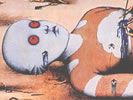Eye For Film >> Movies >> Fantastic Planet (1973) Film Review
The best thing about Tarsem Singh's The Cell (2000) was not its manic cut and dash, nor its psychological sadism – rather, it was a quiet, largely incidental scene in which Jennifer Lopez's protagonist was seen lying back in her bed, smoking a joint and watching a mesmerisingly trippy piece of animation on her TV, which featured hand-drawn psychedelic cut-outs infinitely superior to any of the state-of-the-art, CG-rendered virtual reality on show elsewhere in the film.
Now you can watch the original cartoon from beginning to end without fear of being interrupted by Singh's sub-Silence of the Lambs plotting or JLo's arsing about – for at last, René Laloux's classic Fantastic Planet (aka La Planète Sauvage) has been rediscovered and released on DVD by the aptly named Eureka! label as part of their Masters of Cinema series.

It is hardly surprising that this seventies masterpiece has long been revered by fans of mind-expanding substances. For not only does it feature frame after frame of beautifully coloured landscapes and eerily exotic creatures, but it also boasts a species of giant blue aliens, the Draags, whose principal preoccupations involve blank-eyed meditation, chimerical visions and being quite literally on another planet, and whose very name is a barely concealed reference to drugs.
Similarly the human characters here, the Oms, preface their ritualised love-ins with the consumption of glowing pharmaceuticals, while their name combines the sounds of the French words for 'humans' (hommes) and of the primordial mantra in various Eastern transcendental religions (Om, or Aum). Which is to say that, for those in the right frame of mind, there is more than enough material here to show the way to a higher state of existence.
Yet while it would be remiss to ignore the special place Fantastic Planet occupies in the canon of 'headfilms', that is certainly not its only appeal. For into his sci-fi mindscape (based on the novel Oms In Series by Stefan Wul), Laloux has woven a dense tapestry of allegorical resonances that link the theological to the political to the anthropological.
The principal plot of Fantastic Planet is essentially the biblical story of Exodus reconstituted: a baby Om named Terr is rescued and reared as a plaything by the daughter of the Draag prime minister (like Moses adopted by the Pharoah's daughter), and then grows up to escape and lead his downtrodden fellow Oms to a new land. Similarly Terr's theft of the god-like Draags' knowledge, and the Oms' subsequent expulsion from their home (a Great Tree in an enclosed, Edenic Park), offer rich evocations of the Book of Genesis. All of which is to suggest that Fantastic Planet is an adaptation of the Old Testament for the humans of the future, after Earth's civilisations have destroyed themselves and the exiled survivors must begin once again at the bottom of the evolutionary foodchain.
At the same time, the Oms' new god-like masters, despite their great mental agility and technological advances, are portrayed in such a way as to recall the all-too-human power-players of the 20th century. The focus of a Draag council meeting on factories and productivity levels seems to parody the discourse of Soviet committee meetings (and Fantastic Planet, though French, was animated in then-soviet Czechoslovakia), while the Draags' attempts to gas their planet's human population in a systematic programme of 'de-omisation' has obvious, uncomfortable parallels with the Nazi Holocaust. Not that the human characters get off more lightly, as they are repeatedly brought down as much by their own factionalism, superstition and ignorance as by outside threats.
The strange worlds elaborated by Laloux could hardly be described as utopian, but nonetheless he uses them as a staging ground from which to try to resolve his concerns about the folly and aggression to be found on our own savage planet. To Laloux, even those with pretensions to enlightenment, whether Draag or Om, are really no less capable of cruelty than the predatory beasts that surround them – and this is a film positively brimming with cruelty - but the ultimate key to survival is a willingness to live in peaceful coexistence, and to learn to love both neighbours and neighbouring aliens as much as yourself... and once you have achieved all that, to get off your head as often as possible.
It is a vision very much rooted in its own time, as is the accompanying jazz-synth score by Alain Goraguer – but now that the Seventies are undergoing a renaissance, Fantastic Planet is well worth revisiting. For with its mannered, painterly animation, its lysergic oddness and its seemingly boundless imagination, this retro-futurist Alice In Wonderland burns itself into the brain like no other.
Reviewed on: 13 Sep 2006


















